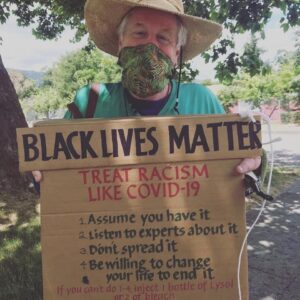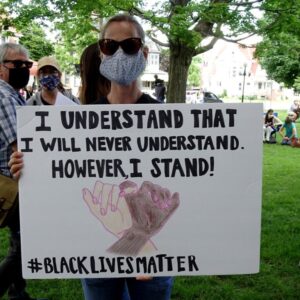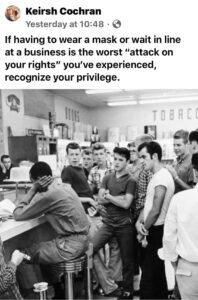We began this series on confronting racism in mid-June.
In Part I, I asked “When did you first become aware of your race?” This was not a question I’d have thought to ask, actually, being of the “race is a social construct” mind set. But I took it from the website of The National Museum of African American History and Culture in Washington DC and the page, “Talking About Race,” so assumed it was a good place to start.
I also shared the quote from Michelle Obama, putting in bold the sentence I wanted us to focus on:
“…Race and racism is a reality that so many of us grow up learning to just deal with.
It’s up to all of us -– Black, white, everyone -– no matter how well-meaning we
think we might be, to do the honest, uncomfortable work of rooting it out. It
starts with self-examination and listening to those whose
lives are different from our own. It ends with justice, compassion,
and empathy that manifests in our lives and on our streets. I pray we all
have the strength for that journey …”
“It starts with self-examination,” Michelle wrote. And so we examined our stories, the ones we’d told ourselves about our beliefs and values about skin color.
“… and listening to those whose lives are different from our own,” she said, which was, I thought, a great segue to this poster I’d found and fallen in love with:

Black Lives Matter, it read. Then,
TREAT RACISM
LIKE COVID-19
-
-
-
-
-
-
- Assume you have it.
- Listen to experts about it.
- Don’t spread it.
- Be willing to change your life to end it.
-
-
-
-
-
I ended that post saying, “We must begin by assuming we “have it” and act accordingly.”
The following next week came Part II: Listening, which brought you far more resources to listen to (read, watch, absorb) than you could possibly cover in two months, never mind two weeks. With one documentary under my belt (13; really, start there), I’m now into my second TV series from that list. I’ve not been reading much this past year so, I was grateful for the suggestions that brought me to the TV screen.
Last week I interrupted the series to bring you the post on Pastor Steven Tendo who needed help, desperately. Lots of people need help, we know. We have the privilege to pick and choose the causes we show up for, and I am very grateful to those of you who wrote me of your experience in calling or writing on Steven’s behalf. I hope to have a follow-up post in a few weeks.
And now we are back with Part III, #3 on that placard:
Don’t Spread It
With CoViD, I trust you are wearing your mask, isolating as needed, foregoing visits and hugs and shared meals. We’ve given up much that keeps us human. Human touch, human contact, smiles, hugs, socializing, banter have become more precious to me as I recognize how much I miss them.
With racism, though, just how does this “Don’t spread it” translate? What can we as individuals do to stop the spread of racism? What is the wear your-mask, stay-six-feet-apart if you can’t stay-home part of the simile/analogy/metaphor?
Some demonstrate.

Some protest.

These choices are not for everyone. What else can you do if the scourge of racism in this country has moved you to want to do something; how else might you “take a stand?”
Fortunately, there are many ways to take action at this time.
When I first read this article from Medium, in 2017, it was titled 75 Things White People Can Do for Racial Justice. I just checked it in prepping for this post and saw it is now titled 97 Things White People Can Do for Racial Justice. The list is growing! Check it out.
But since most of us are writers as well as readers, I’m focused on words: the words we use and the words we hear. Words are powerful. The pen is mightier and all that. I needn’t convince you. And so I have only two things you can do, starting today.
1. Become aware of phrases you probably never knew had racist origins.
There have been numerous articles on this topic. I deleted the duplicates and pulled this list together. If you’re interested in pursuing their racist origins, I’m sure Mr. Google will be eager to help.
Cakewalk
Eenie meenie miney moe
Gyp
Indian giver
Long time, no see
Mumbo Jumbo
No can do
Paddy wagons
Peanut gallery
Sold down the river
Tipping Point
Uppity
2. Call out racist jokes and comments.
Silence is a choice. Silence often implies acceptance.You know a racist comment when you hear one. Stand up, refuse to go along. It’s really simple; not easy, but simple.
Let’s return from whence we began, with Michelle’s quote. This time I’ve put a different part in bold.
“…Race and racism is a reality that so many of us grow up learning to just deal with.
It’s up to all of us – Black, white, everyone – no matter how well-meaning we think we
might be, to do the honest, uncomfortable work of rooting it out. It starts with
self-examination and listening to those whose lives are different from our own.
It ends with justice, compassion, and empathy that manifests in our
lives and on our streets. I pray we all have the strength for that journey …”
How about you? Michelle says this work of rooting out racism will take strength. What do you think it’ll take? How might you “change your life” to put an end to racism, if not for your lifetime, than for your children’s children? What are you willing to do?
Joan Z Rough
Thank you for all the lists and pertinent information you are sharing! It’s all important.
Janet Givens
Thanks Joan. (You’ve got a new browser? I had to Approve you this time). This is an unprecedented time in our lives. I hope we both live long enough to see the changes that surely must come.
Tim Fearnside
Good stuff, Janet. Thank you. And apologies for being absent these last few weeks. Too many things, lately, slipping through the cracks. On a positive note, I’ve been fairly busy lately dealing with board issues with respect to the nonprofit I’m involved in, as my term as board president is expiring. (That’s not the positive part). I’m happy to report our organization has been deeply involved in the antiracism discussion in our local arts community, and is emerging as a leader in that arena. There are serious risks/landmines, serving a predominantly white community, but we recognize that the importance of this work, and our board is 100% philosophically aligned. On another positive note, we recently were awarded our 2nd-ever NEA grant – one of only four arts nonprofits in our state to do so. So, good things are happening, despite all the crud going on in the world right now. Of course, talk is one thing, and action is quite another. The success of our commitment will ultimately be proven by our actions going forward. Thank you for your commitment to this critically important issue.
Janet Givens
What an exciting time for you Tim. And Congratulations. Grammar school is, IMHO, the best time to teach about racism, prejudice, bias. So, you are in an important position vis a vis the ability to impact future generations. I was very fortunate to have the experiences my grammar school gave me. How many schools taught about prejudice in the 50s? Someone told me at our 50th H.S. reunion that my town had been part of a “model cities” program back then, but I’ve been unable to find out any further info on it. Welcome back; you were missed, and Idaho has been so hard hit with CoViD. Good to know you were “just” busy.

Janet Givens recently posted…Confronting Racism Part III: Don’t Spread It
Laurie Buchanan
Janet — There are ALWAYS excellent posts on your blog. I ALWAYS come away with new information. Thank you!
Janet Givens
Thanks Laurie. From you, that means a lot.
Janet Givens recently posted…Confronting Racism Part III: Don’t Spread It